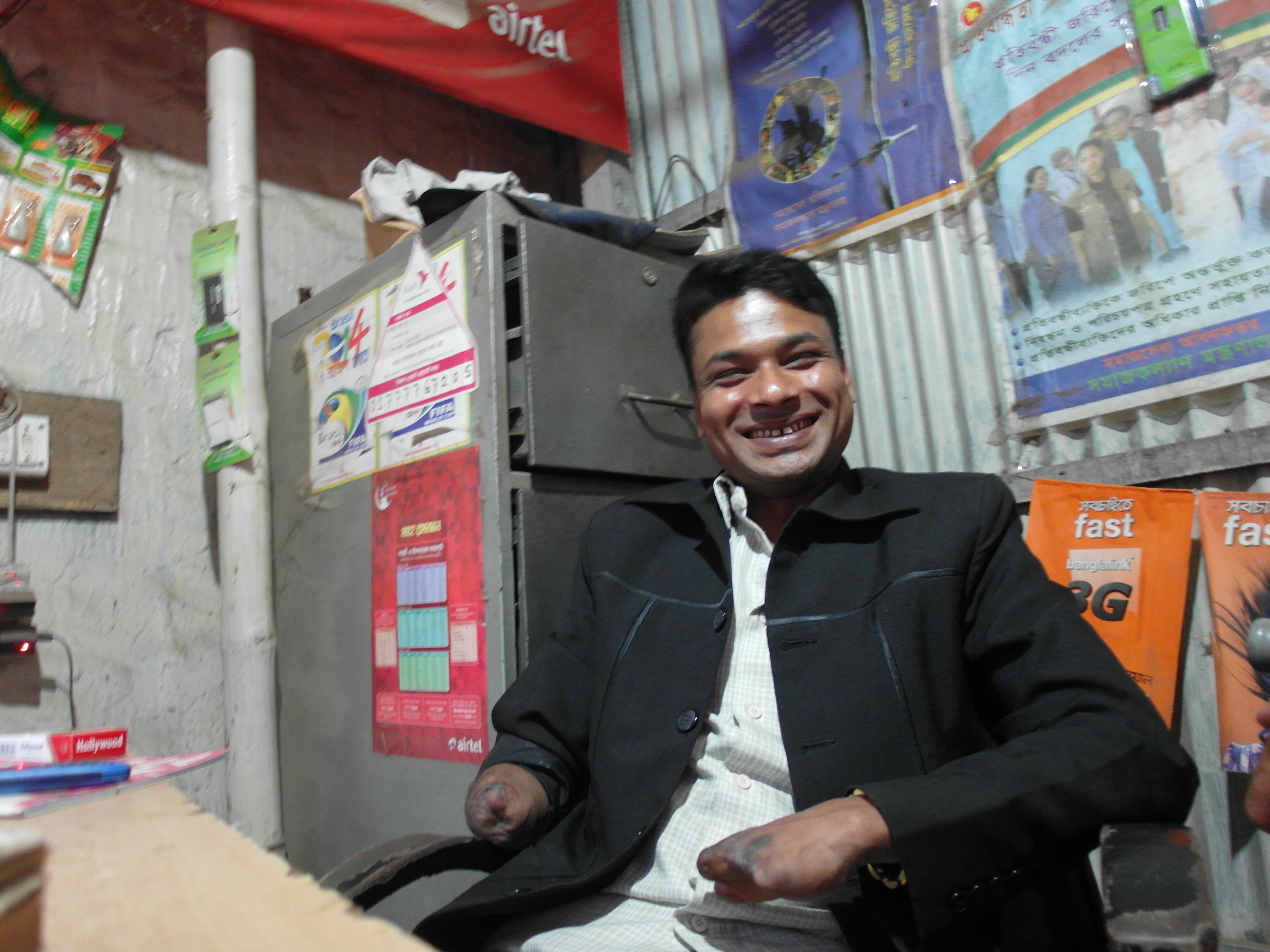A few months ago, I’m speaking to Mosharrof on the phone. I’d never met him, but I did know him from a video: A father, a mechanic, a trainer, an entrepreneur and disabled – in that order.
It’s less than a year after the video was filmed and Mosharrof is no longer working as a fridge-repair mechanic. When I ask him why he stopped, he says “it’s because I don’t have hands.”
Not only has he changed his profession, but it’s because of his impairment. That seems pretty bad for him – and it wasn’t at all what was understood in the video. The video was pointing out the opposite, that he was an example of someone who had gotten past his disability. I don’t mean “get past” it to say that one has “overcome” one’s disability. The nice thing about the write-up is that it’s not based on that cliched story of overcoming. It isn’t the story of an accident, a painful period of readjustment and an inspiring new birth. All those things are there, but in a different order: it starts out with what Mosharrof has managed to do and what he’s achieving in the present. The whole point is that the fact he doesn’t have hands isn’t the way you understand him as a person. Except now, on the telephone, he’s telling me it is.
So off we go to meet him. He has a shop now, where now he apparently sells mobile-phone credit. This is also something that turns out not to be the case. While we’re talking to him in the shop, several people come to try to get mobile-phone credit and he turns them away quite abruptly saying he’s busy. What he’s actually gone into money-lending. He gives loans and takes interest. How many loans do you have out, I ask, 10 or 20? He gives a number, and it’s over 200. He took the capital from his fridge business and he’s giving loans for small businesses.
Now, I can get over him not having hands, but I can’t get over the fact he’s not a fridge mechanic any more. This time he gives a longer story of something else he had also mentioned on the phone. He ran his business by training people to work with him. He would “teach them, feed them, give them a place to stay” and then – once they had learned – they would leave. Because they leave he doesn’t want to continue.
He seems to be doing pretty well with his moneylending. He’s also busy and enthusiastically setting up an organisation to help other disabled people. He’s collected the names of over 200 people with disabilities and he’s trying to help them by linking to services, like getting free wheelchairs.
I, still on the fridge-repair, ask him whether I should feel happy or feel bad he stopped doing it. He avoids the question. I ask again. He says yes, of course I should feel bad that he stopped his job as a mechanic. He then cheerfully goes on to say that he still has lots of offers to do fridge repair and can go back to doing it anytime he wants. And he’s going to go on teaching, too: “from now on I’m only going to teach disabled people”. Oh, and another thing he’s involved in: local politics.
So I’m still not sure about how we should feel. The problem of apprentices leaving is a common problem for businessmen in Bangladesh, and certainly the fact that Mosharrof doesn’t have hands will have made this a significant difficulty for him. But it’s impossible to feel bad for someone so engaged with his present and future and so entrepreneurial. He explains his business choices excitedly and tells us why he got the shop in the location he did, the deal he did to get it and plans to expand. He shows some papers he got on how to apply for money for his disability organisation. Today, they are unfamiliar to him, and he isn’t sure what’s in them. He seems like the kind of person who will have it all figured out by tomorrow.
Time for several disclaimers! I wasn’t directly involved with their production, but the video and case study were made by a project I was working for, and I’m still working for the ILO in Bangladesh. When I asked Mosharrof if I could share this story he said yes and asked to be put in touch with foreign organisations that could help fund his NGO: so if you have ideas here, please do let us know! Obviously opinions here are mine, and anything I tell you about Mosharrof should be taken with a pinch of salt. After all, by the time you read this, he may be doing something else entirely.
